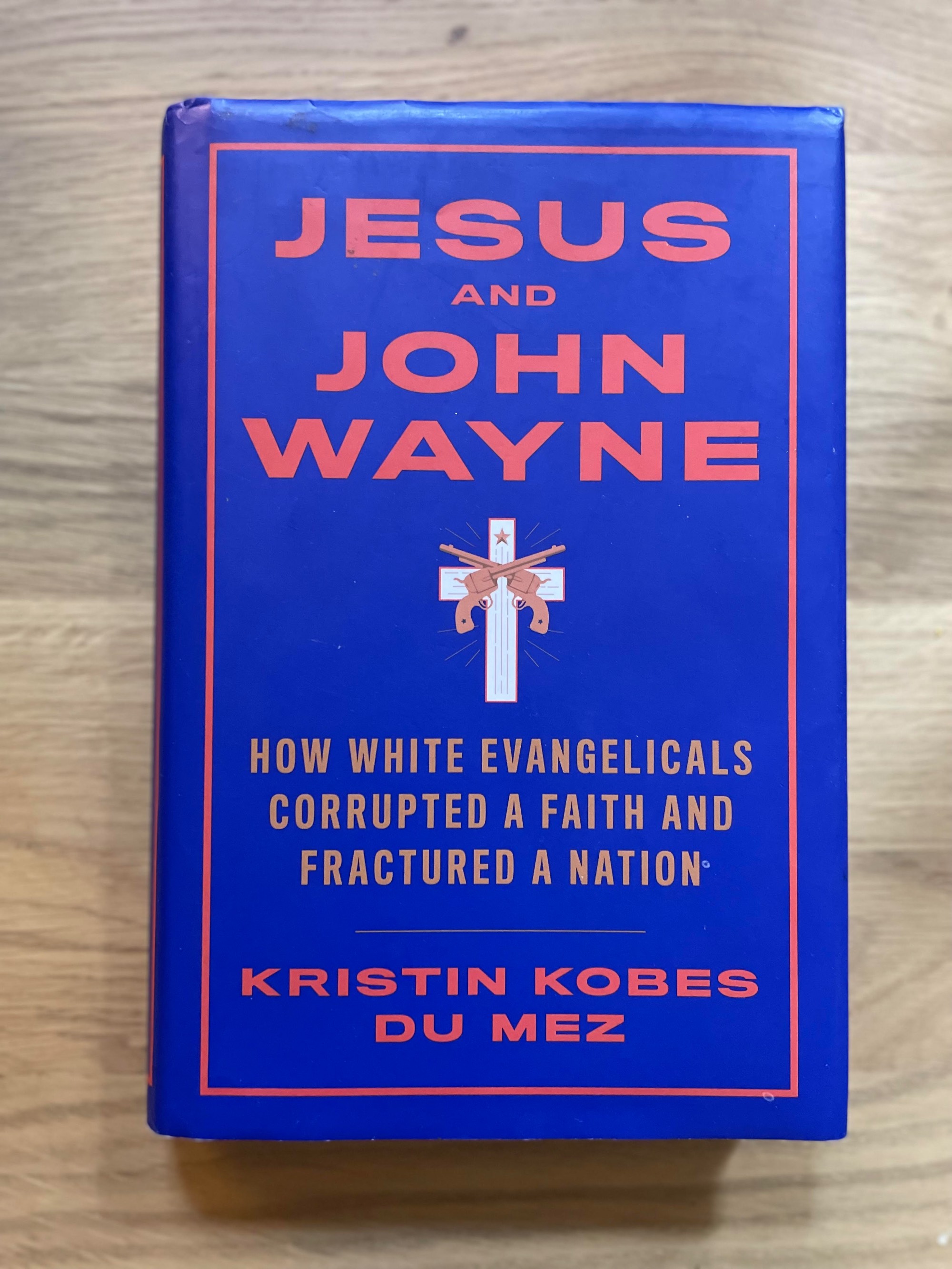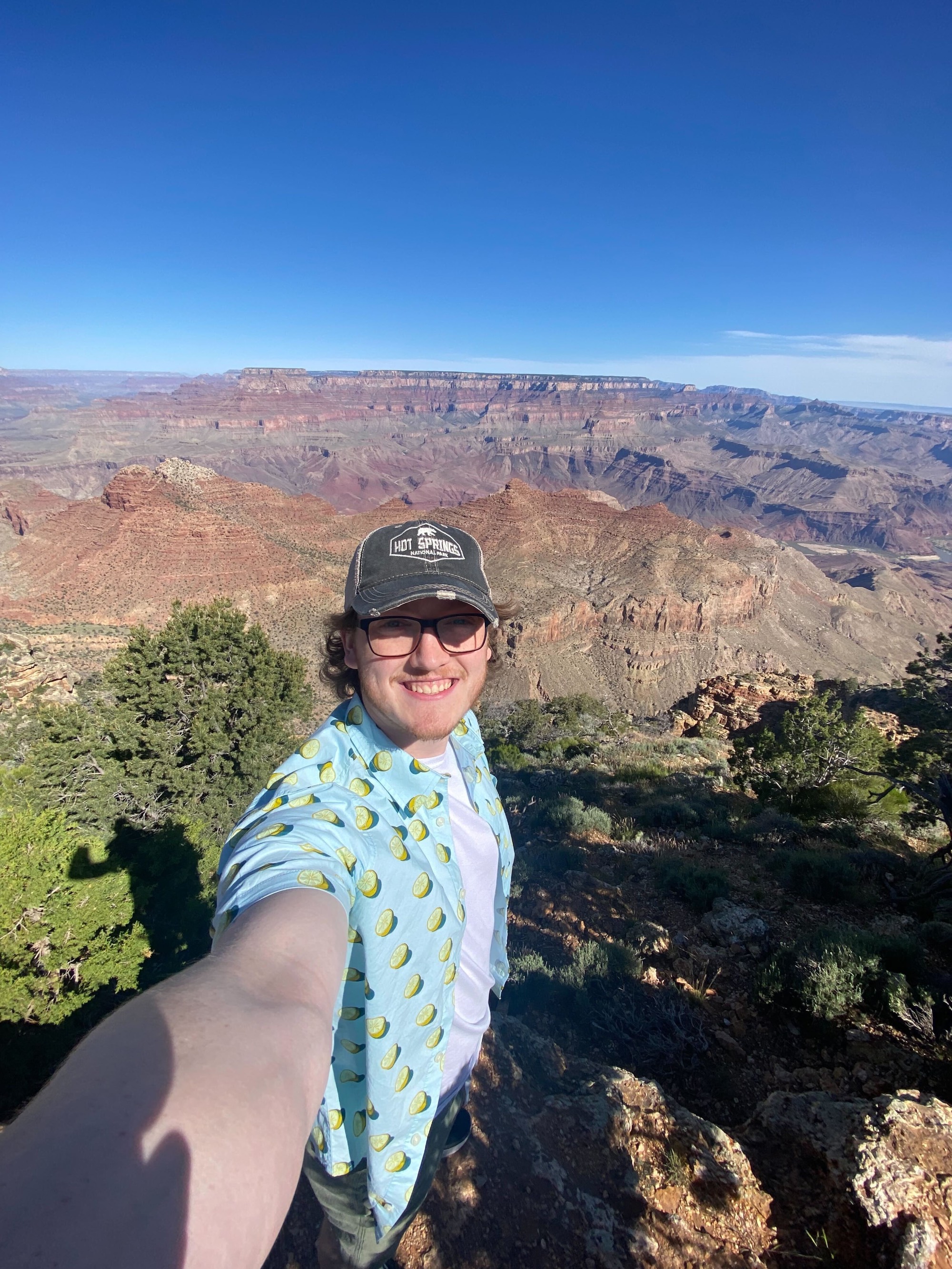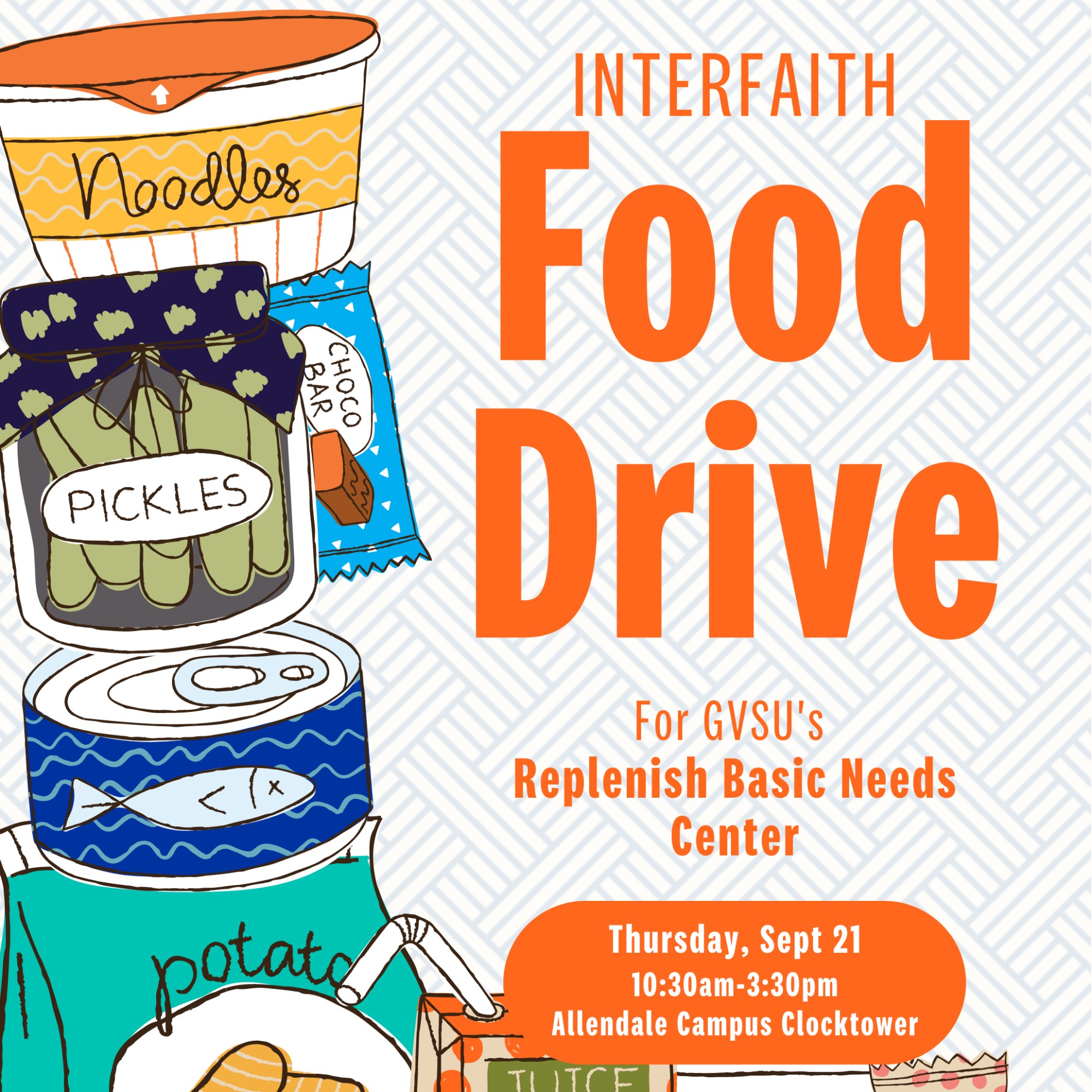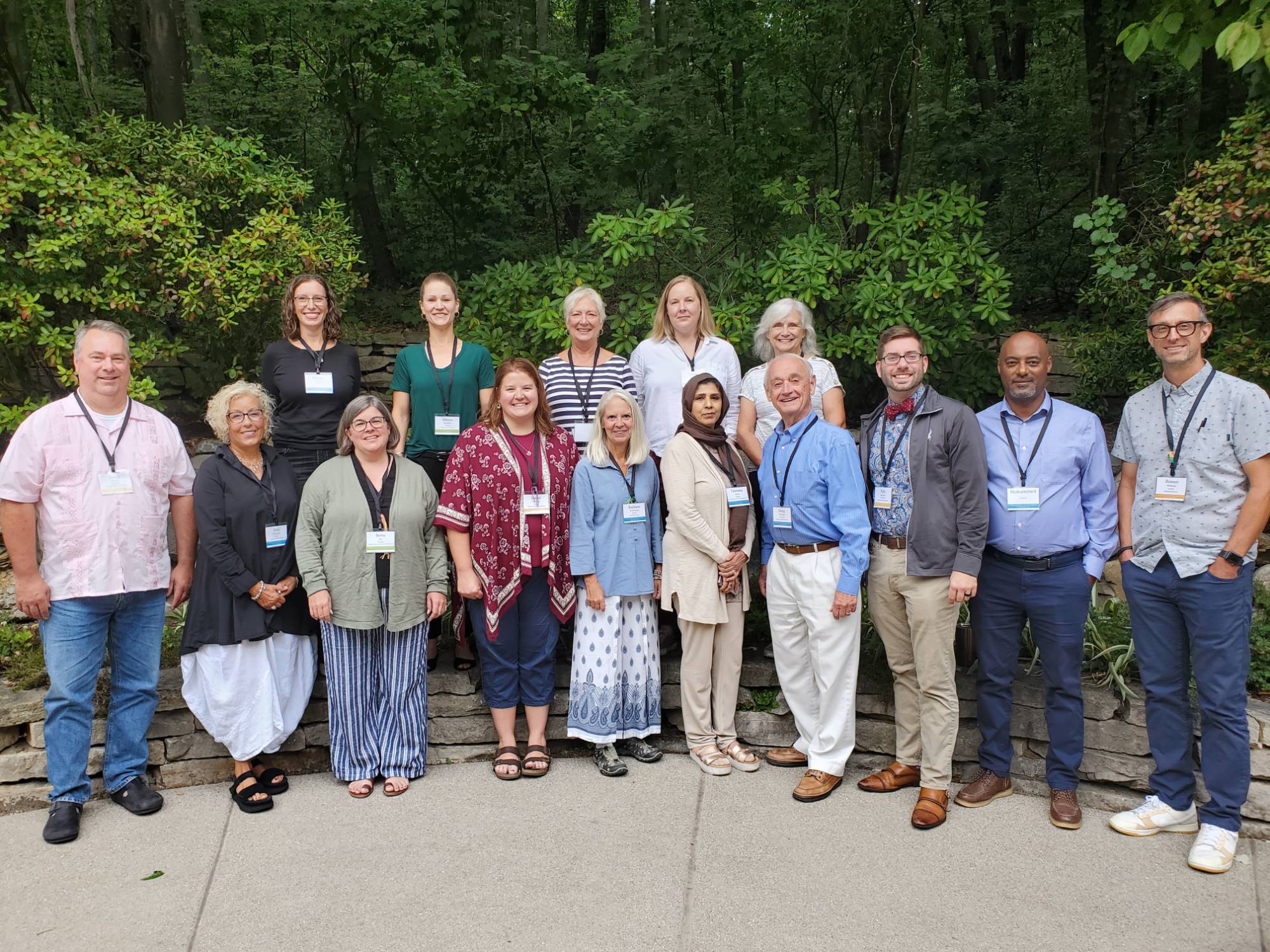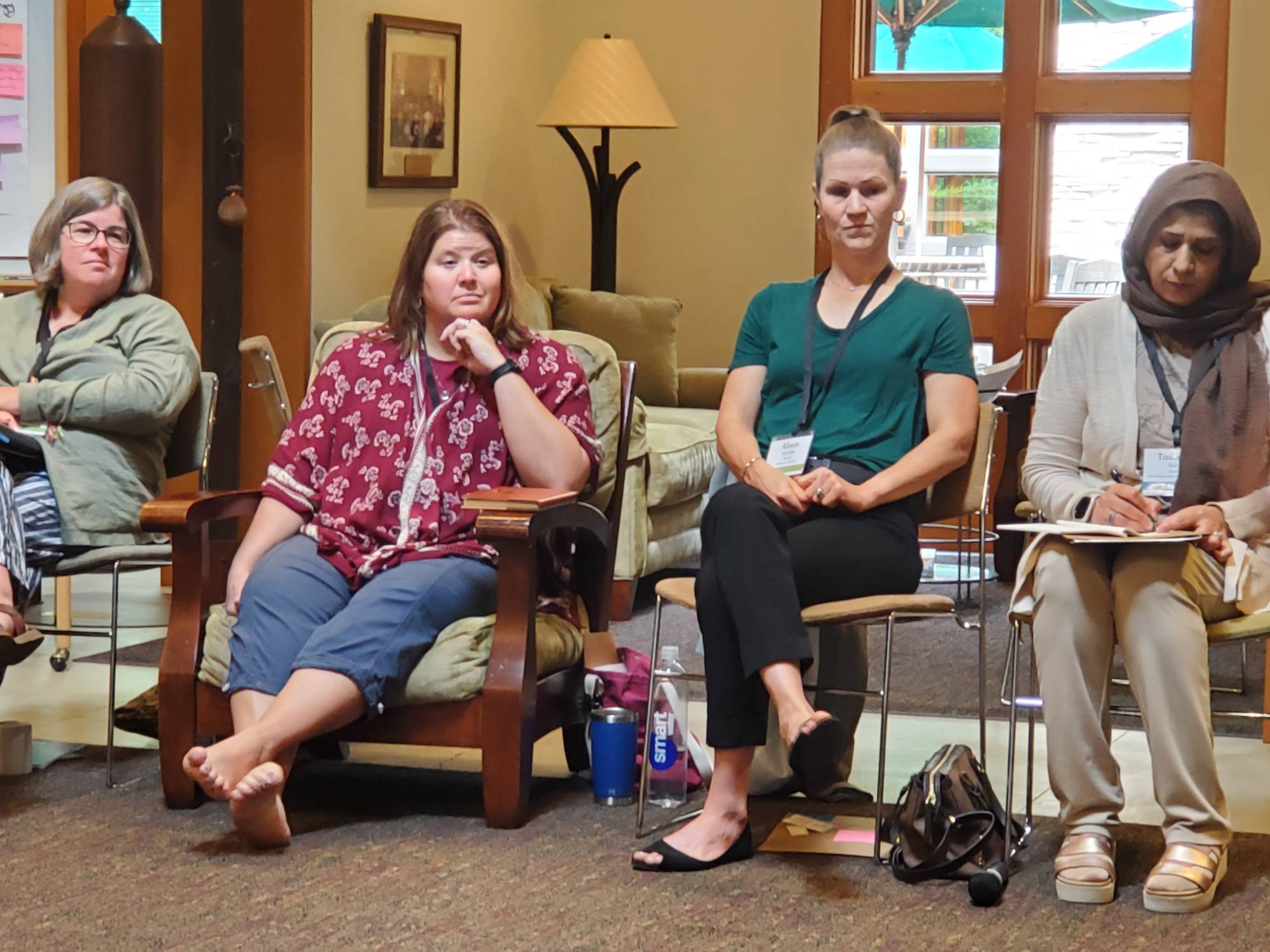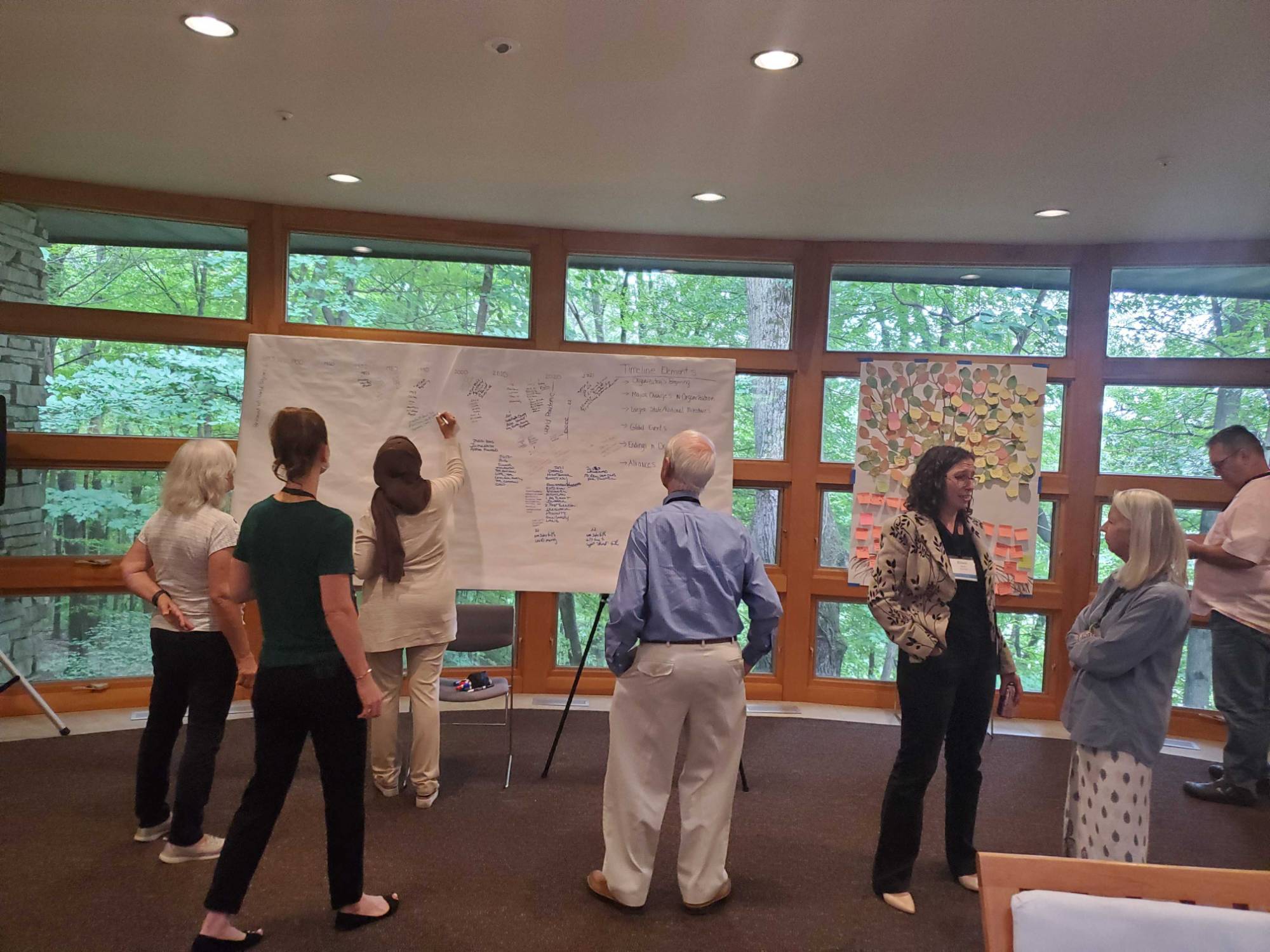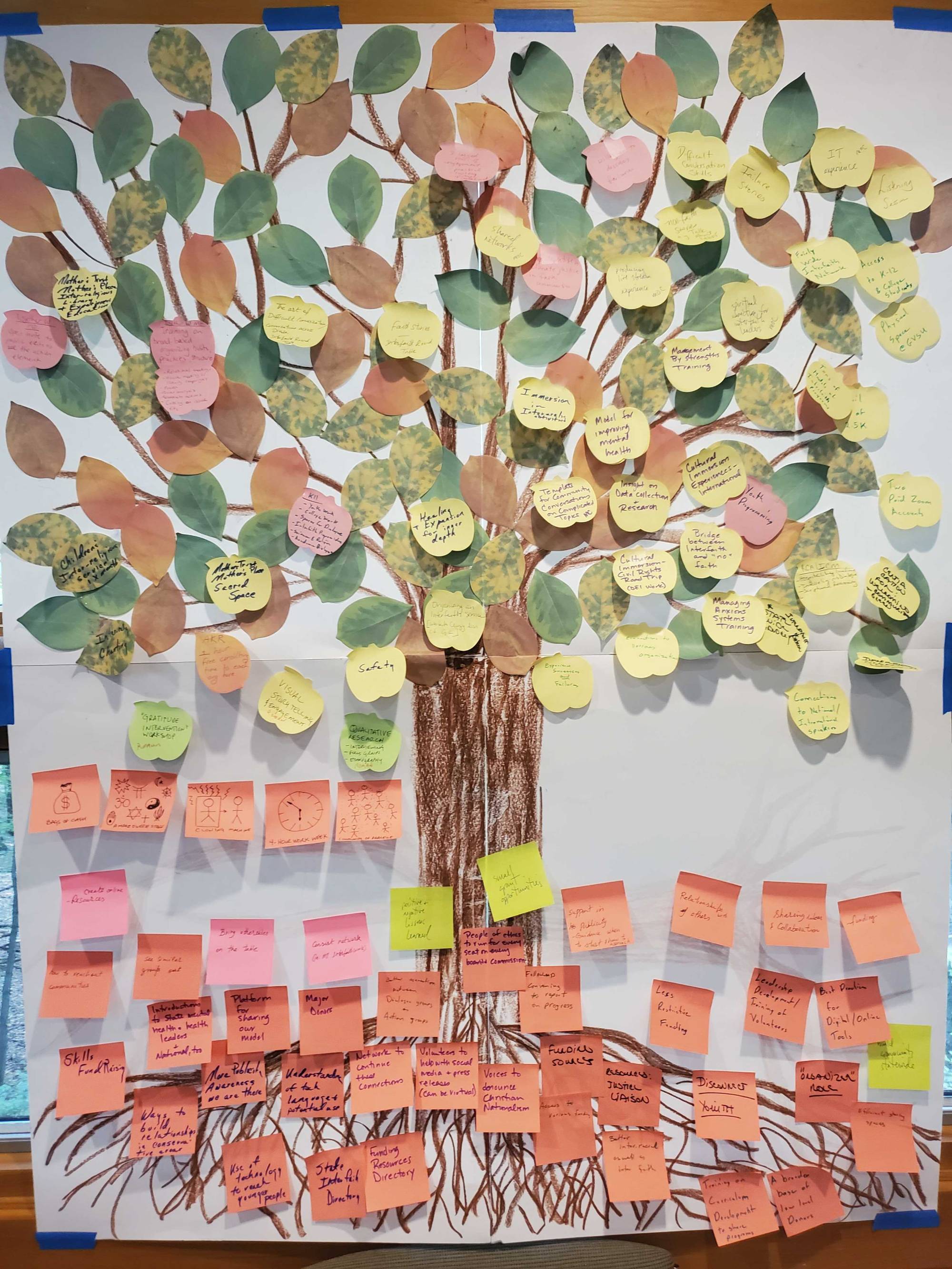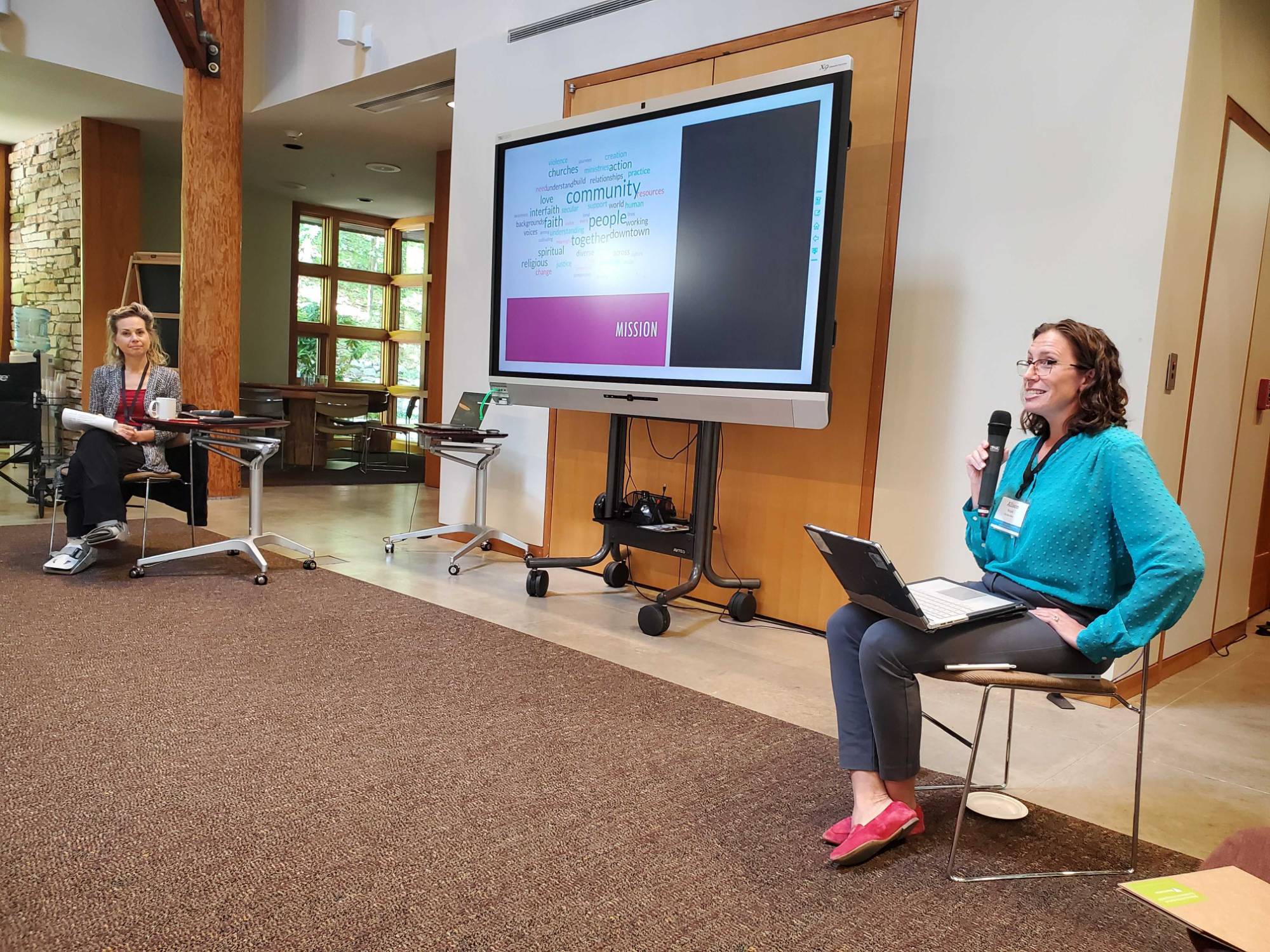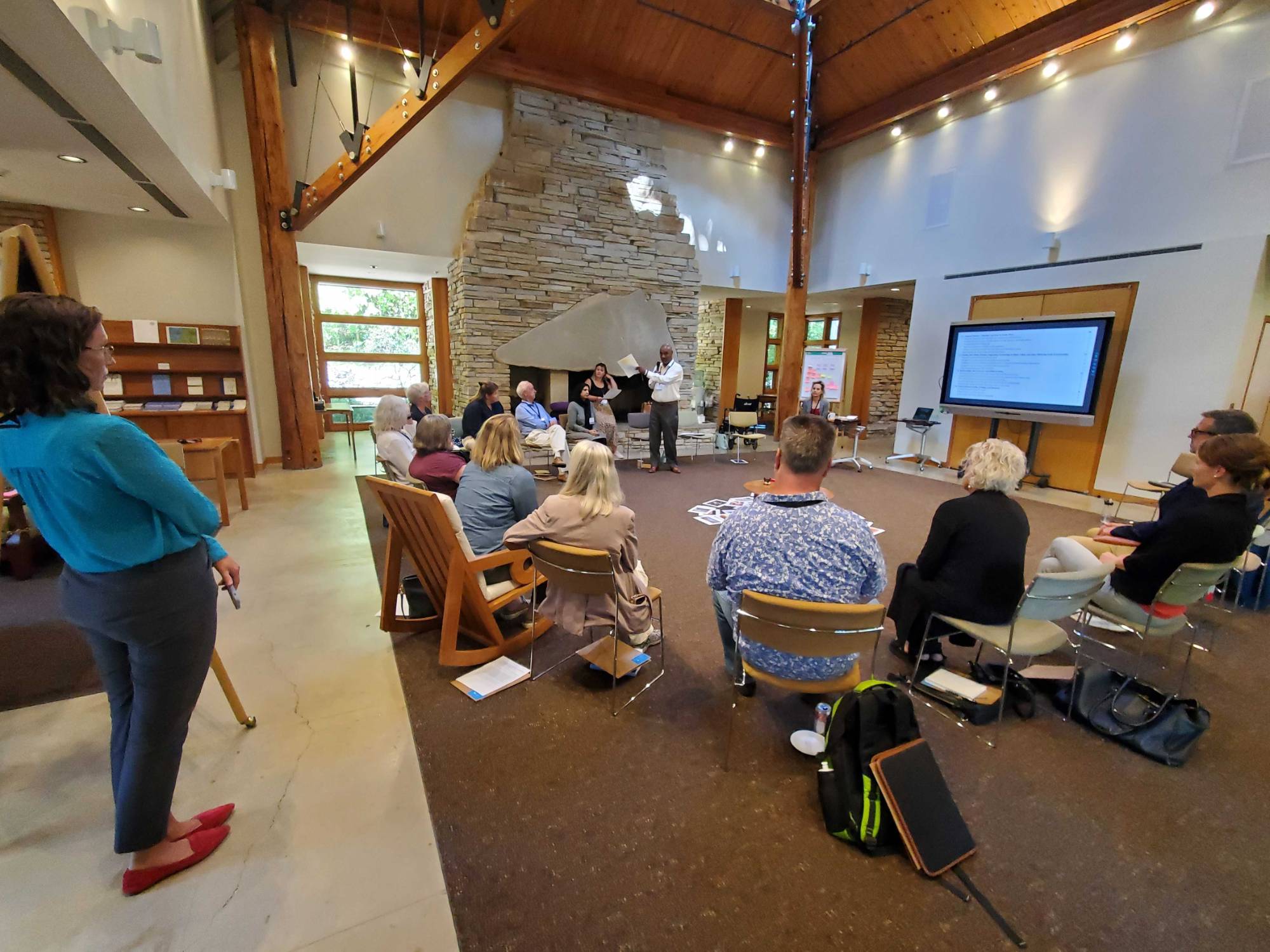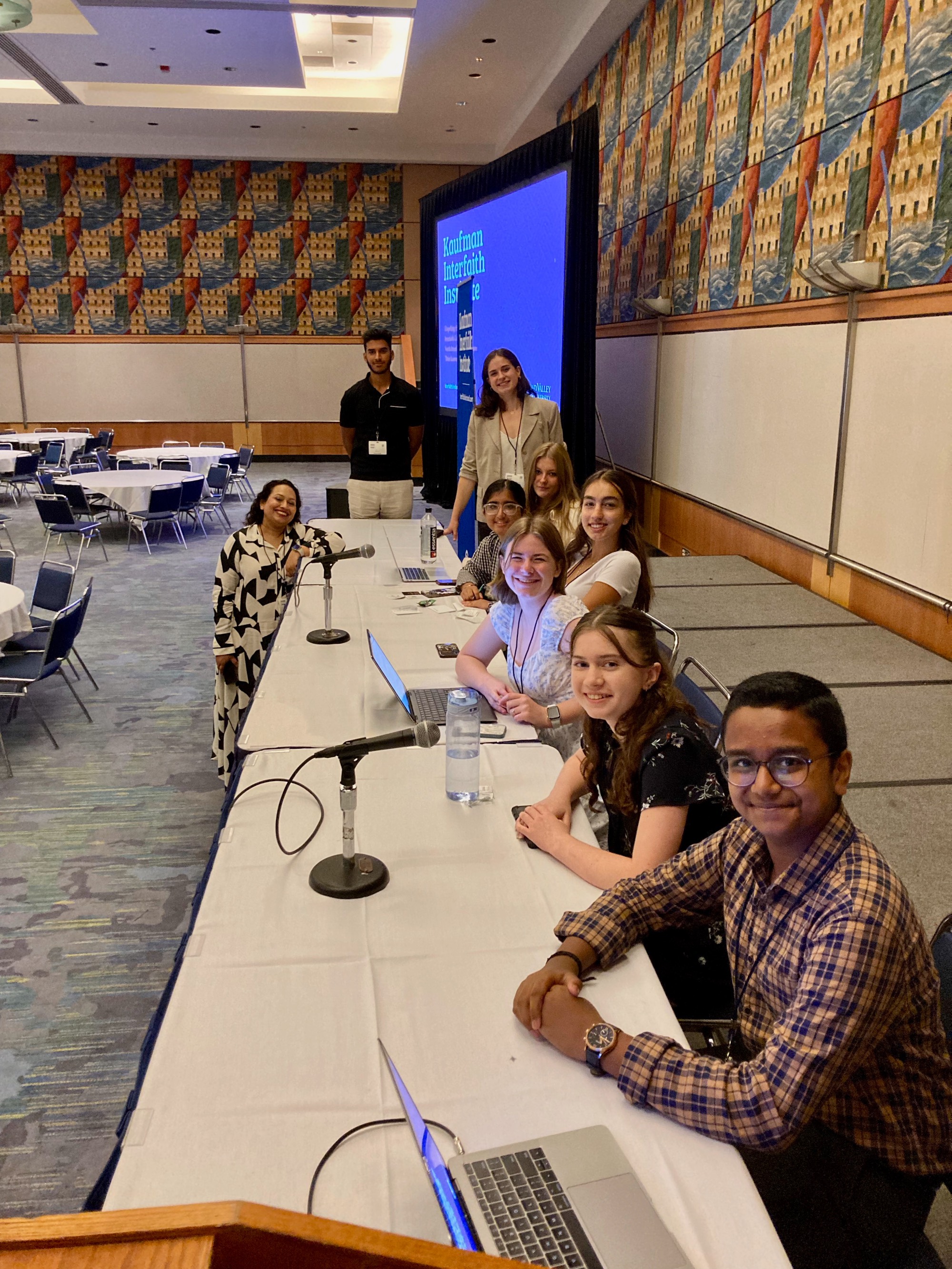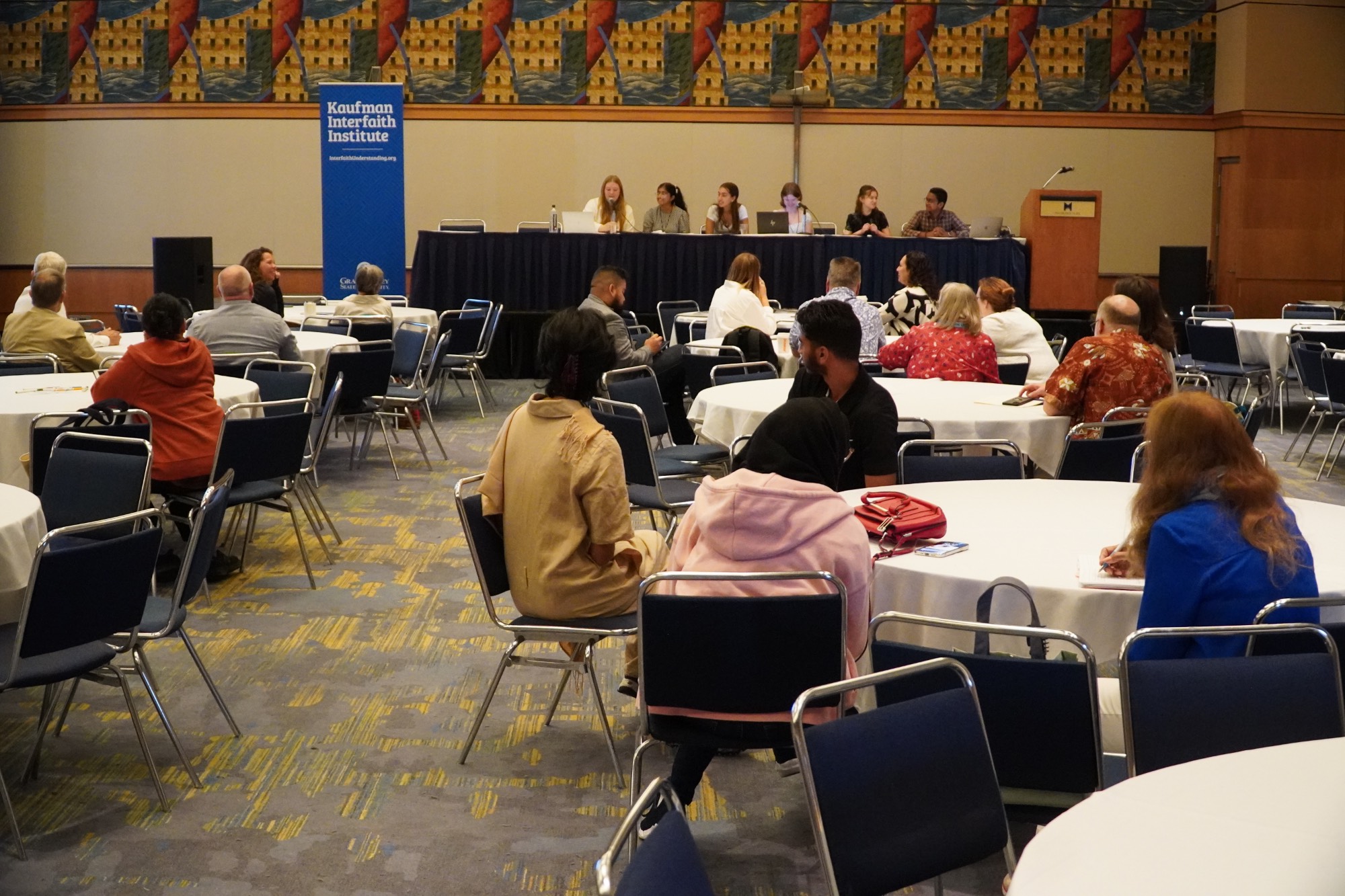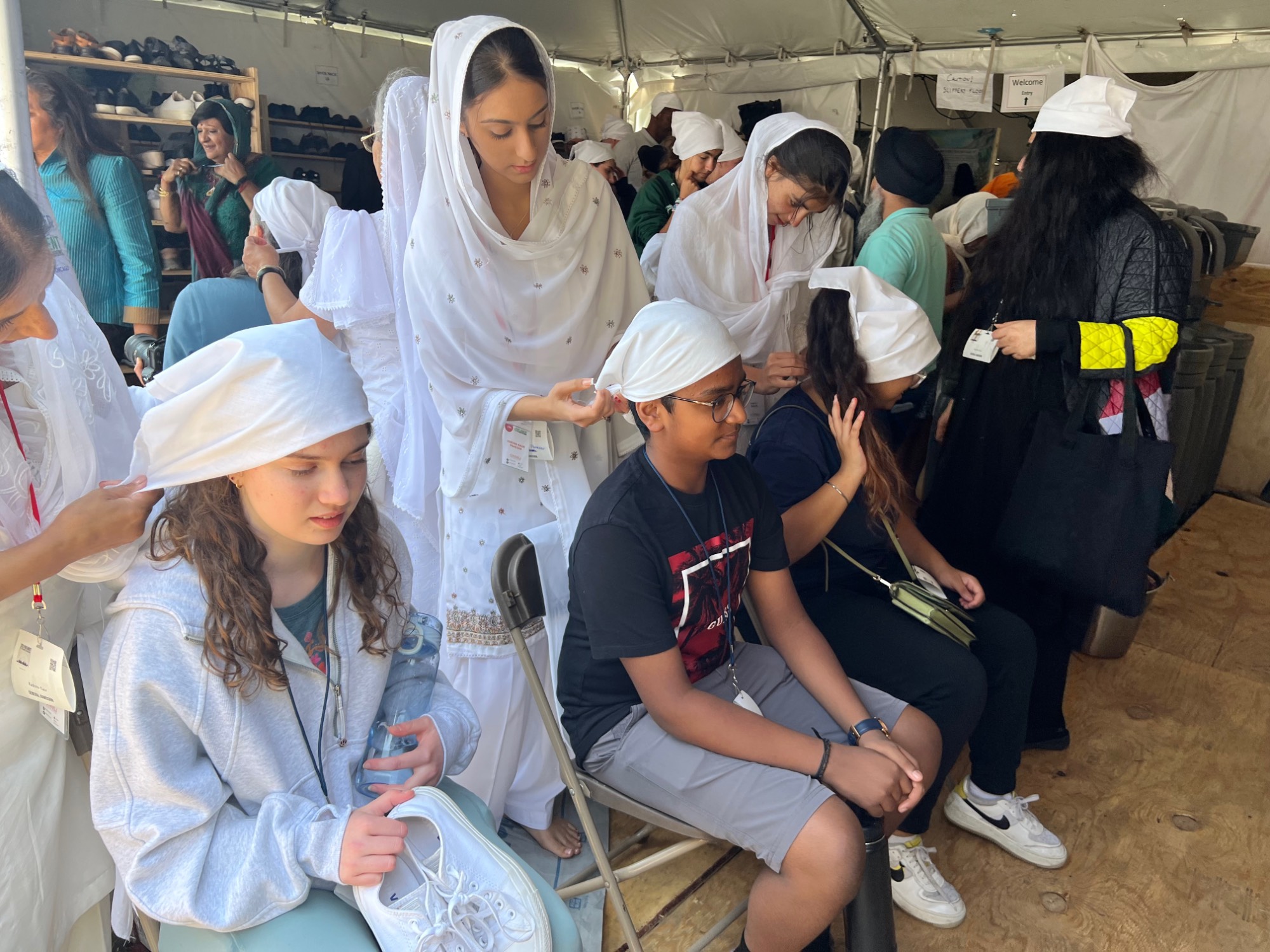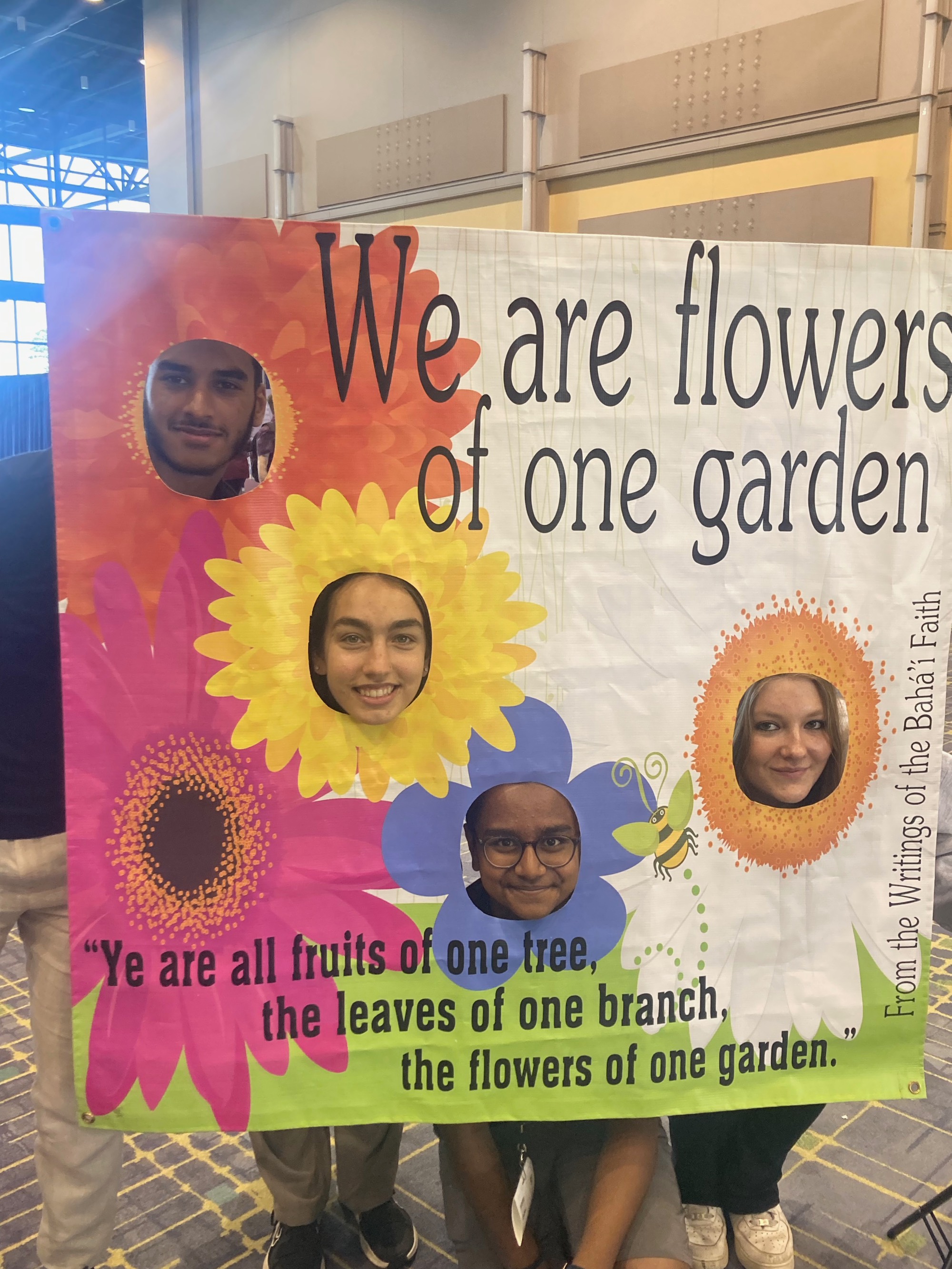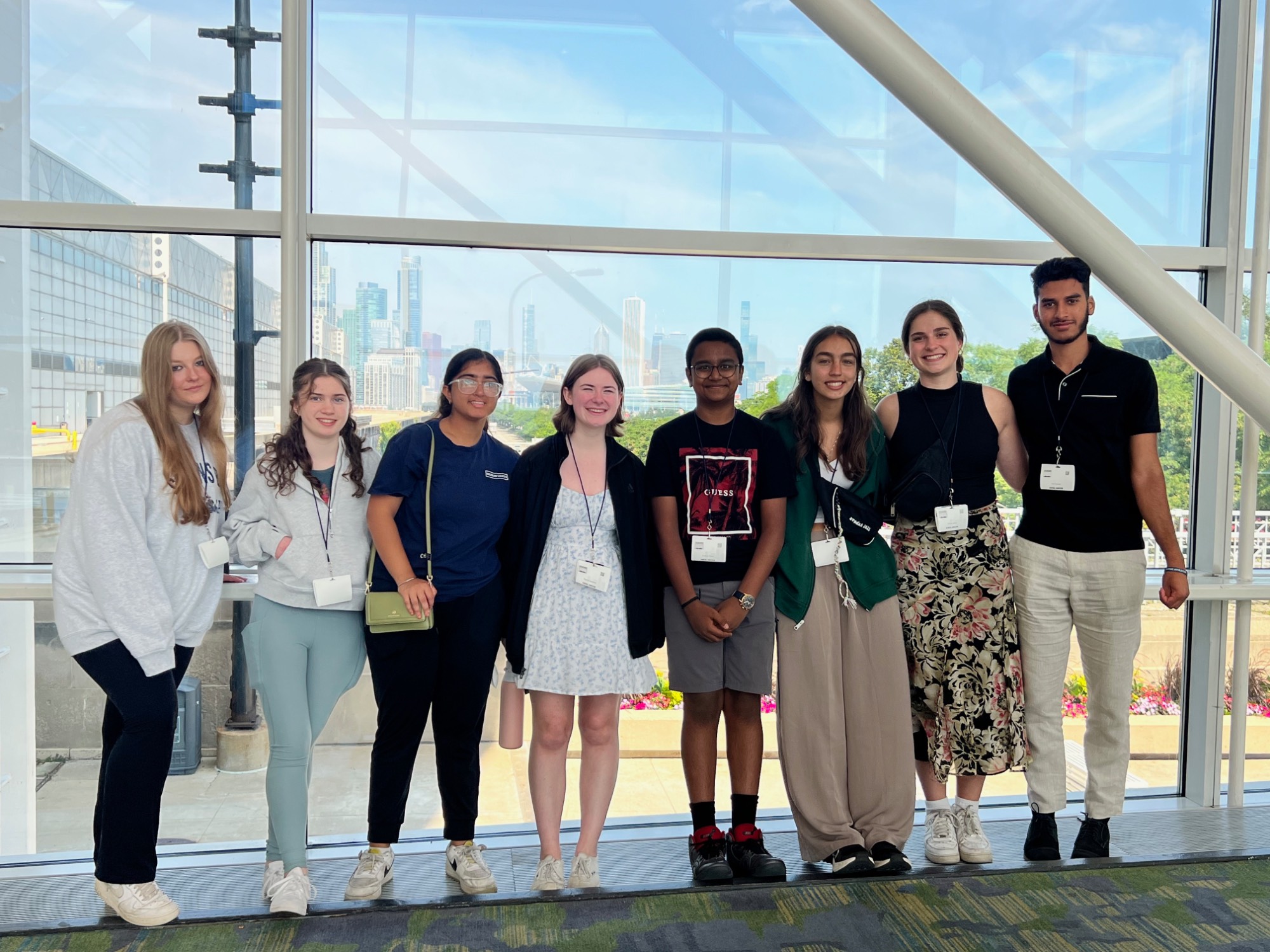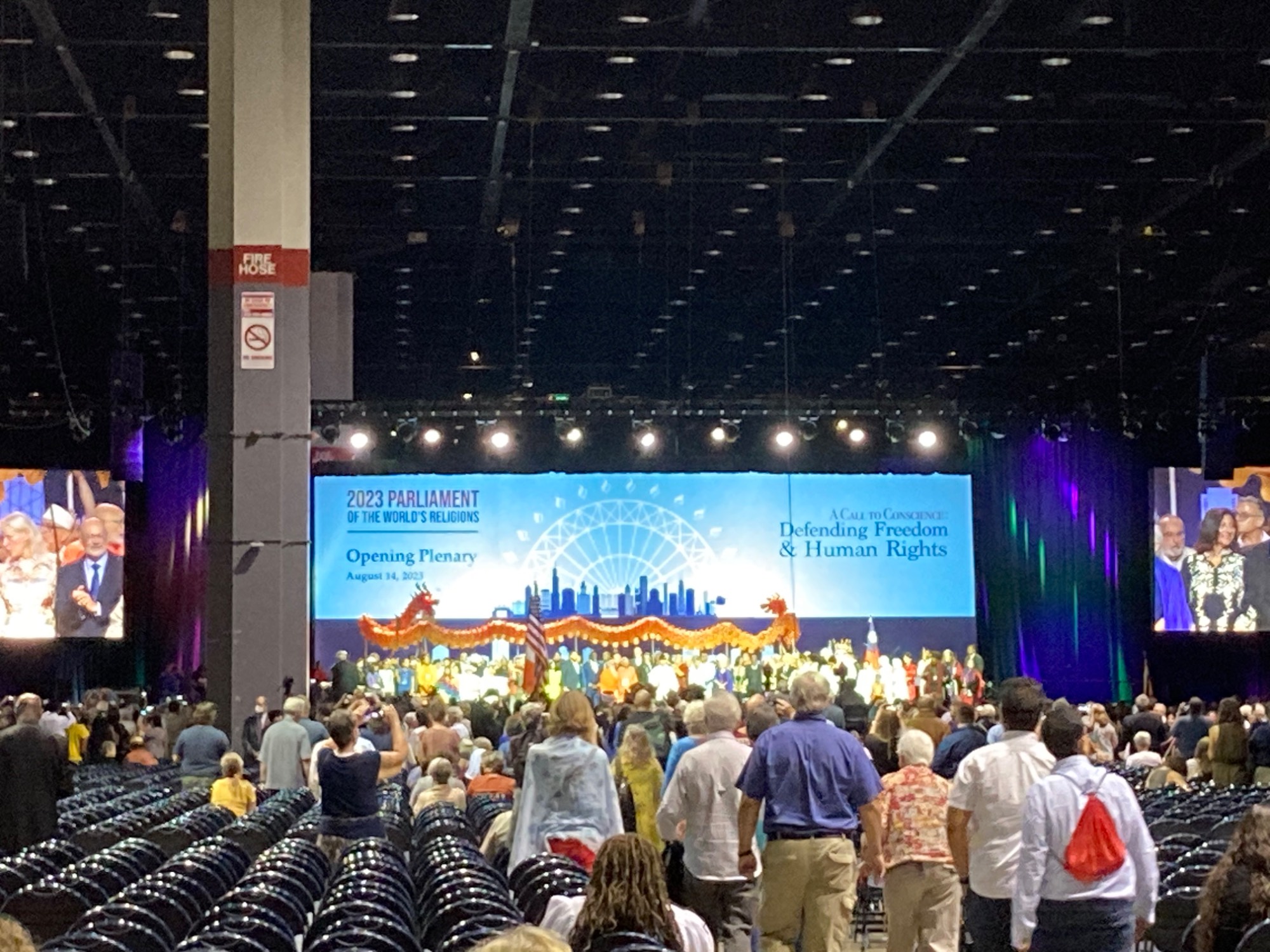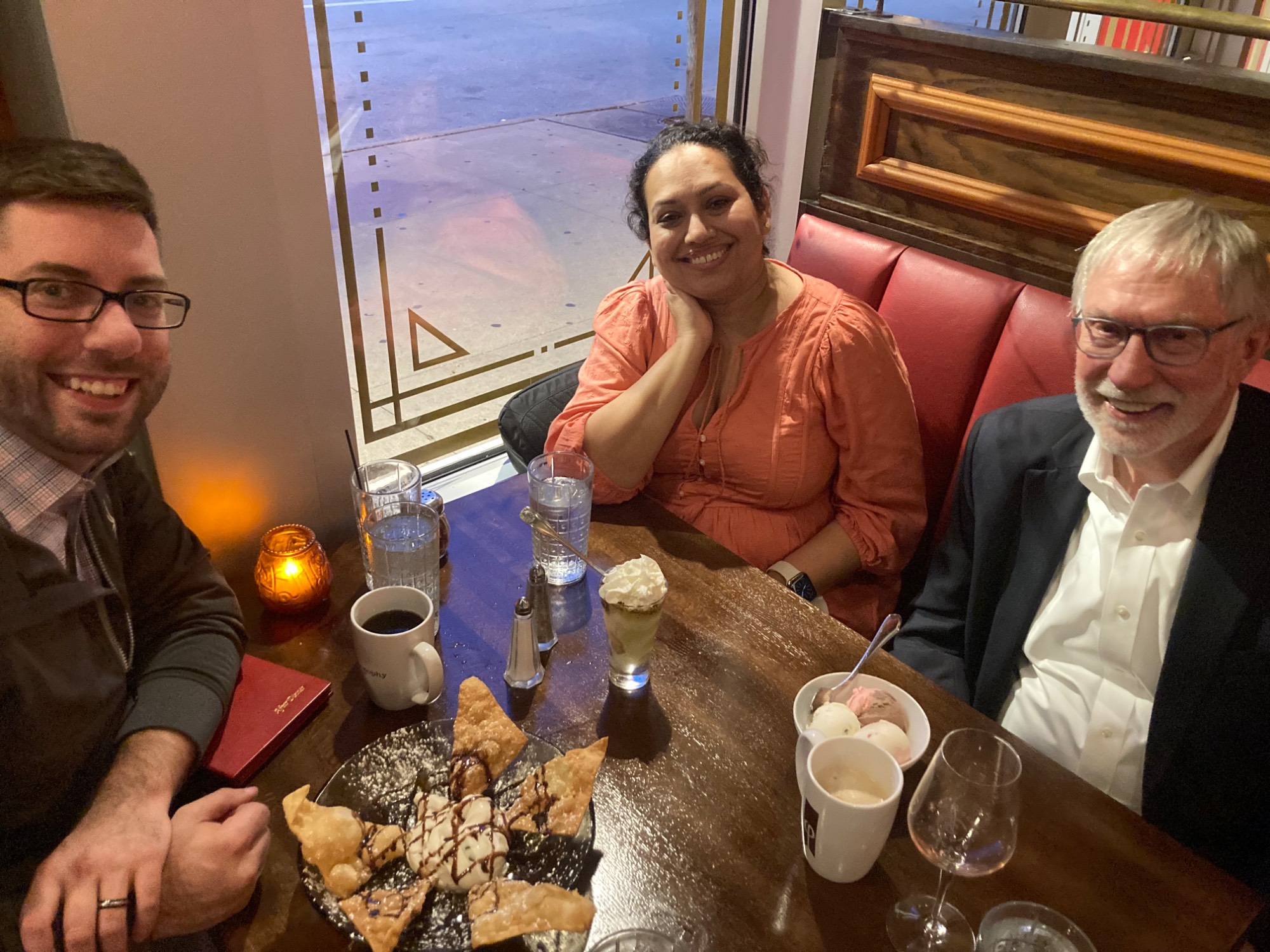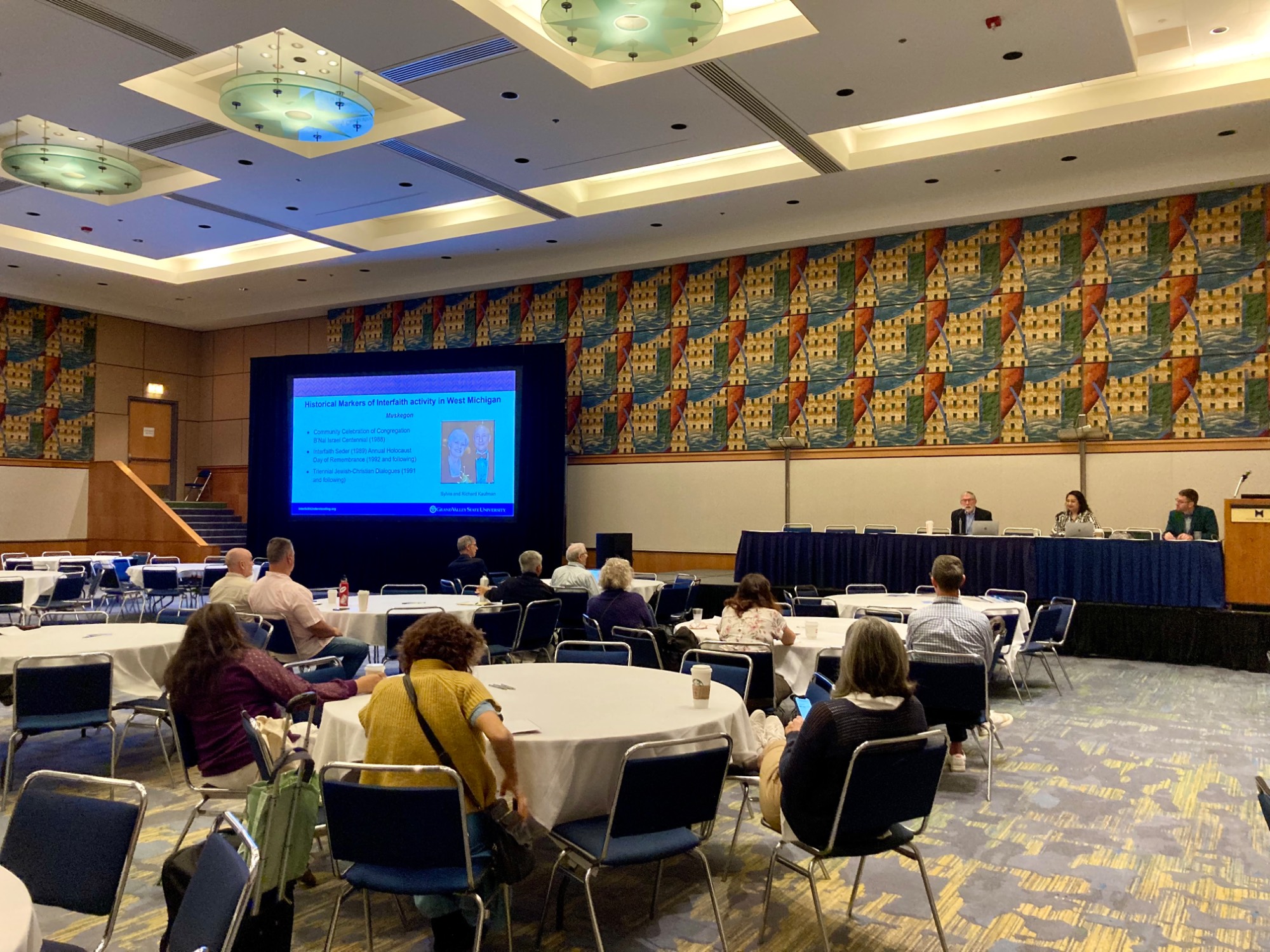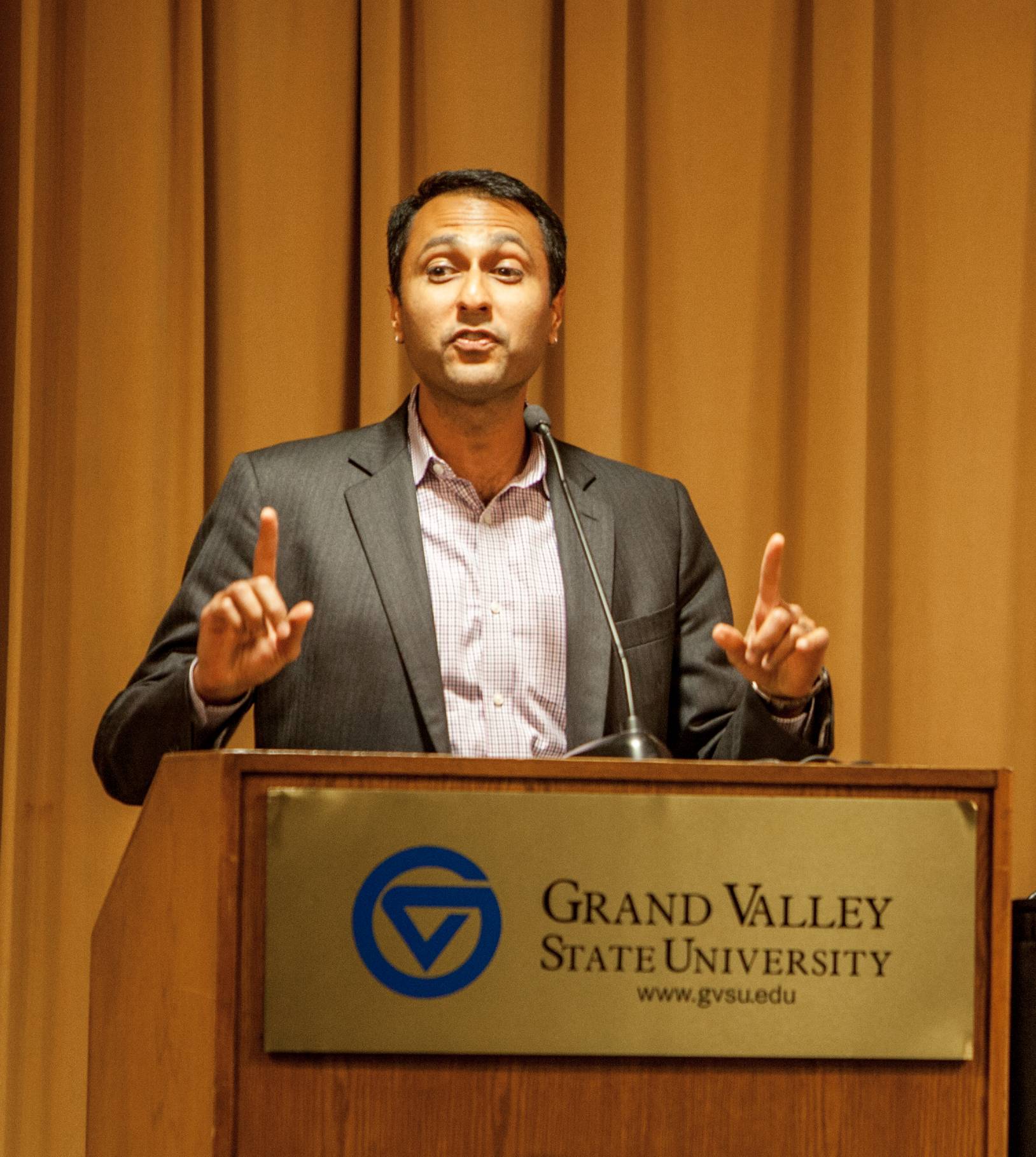Kaufman Updates
Permanent link for Jesus and John Wayne: A Book Review and Look Into a Larger Dialogue, by Cecelia Olson, Kaufman Campus Intern on November 10, 2023
As part of my education here at Grand Valley students are required to take courses related to global issues and conversations. This led me, fittingly, to a classroom full of students dedicated to learning about the history of religion within the United States. Supporting our efforts of further research on religion that pertained to our personal interests our professor assigned a book review and research proposal. This is how Jesus and John Wayne by Kristin Kobes Du Mez entered my life.
For some background information, Kristin Kobes Du Mez is an American Historian having been published on multiple occasions and earning a place on New York Times BestSellers list. She is currently also a professor at Calvin University in Grand Rapids, Michigan teaching courses surrounding History and Gender Studies. Du Mez earned her PhD from the University of Notre Dame and her studies surround the intersection of gender, politics, and religion. While she has written numerous articles for various media companies like NPR and the New York Times, she has two book publications of her own authorship: A New Gospel for Women and Jesus and John Wayne.
The full title of this Evangelical American history book is: Jesus and John Wayne: How White Evangelicals Corrupted a Faith and Fractured a Nation. While I am personally a Christian, I find myself a minority in America as a traditional Orthodox Christian, therefore not falling under the umbrella of Evangelicalism like most Protestant traditions here in the nation. I say this to highlight how little I know about this version of Christianity that has dominated much of American history and identity, and as Du Mez showed me, has influenced American culture in deeper ways than I had ever thought.
There is not a particular progressive agenda with Jesus and John
Wayne. Written around the time of the 2016 presidential election
many people in the nation were puzzled and asking, “Where did all of
these Trump Voters come from?” and Du Mez offers an answer. It is no
surprise these voters were largely made up of politically
conservative Evangelical Christians, but how did this strong and
unique identity even develop in the first place? Jesus and John Wayne
works retrospectively to untangle the history of social and political
movements of the past century that have created the present day
“evangelical cult of masculinity” (301). Very broadly summarized, Du
Mez unpacks how white Evangelicals in present American society are not
only a distinct group, but a group not totally submitted to the
theology and scripture of Christianity. She suggests they are rather
people of a culture that promotes rugged individualism, patriarchal
authority, militancy, as well as American nationalism and superiority,
but didn’t want to give up the label of Christians.
Du Mez does not focus on anything specifically Interfaith within her
work but she does thoroughly demonstrate the depth of relationship
between religion and culture.
This is obviously not a new concept,
the intertwinedness of religion and culture, but the general belief is
that religion dictates culture. Jesus and John Wayne brings to our
attention a group of people who have lived in the inverse, where a
culture dominated and “corrupted” a religion.
Du Mez writes, “By the early twentieth century, Christians recognized that they had a masculinity problem. Unable to shake the sense that Christianity had a less than masculine feel, many blamed the faith itself, or at least the “feminization” of Victorian Christianity, which privileged gentility, restraint, and an emotive response to the gospel message”(15). The virtues that are the pillar of Chrsitan life, patience, love, peace, gentleness and so on, are not conducive to the American man or the image of American masculinity.
Jesus didn’t look, talk, or act like John Wyane. This rugged and militant American culture clashed with Christianity and the image of Christ was corrupted.
This reality Du Mez untangles, opens a dialogue to a much larger conversation of Christ in America. As an Eastern Orthodox Christian, the image of Jesus and Christianity I witness in Evangelicalism and Protestantism in general, is very different from the Christ I know. But oftentimes these are still images of Christ I can recognize because it is still the God of genuine love for thy neighbor and thy enemy.
Other times I see a weaponized version of “Christ”. Just the other
day, on Grand Valley’s campus there was a group of preachers who
called themselves Chrsitans but
shouted nothing but superiority,
contention, exclusivity, condemnation, and hate towards others.
They didn’t look, talk, or act like the Jesus I know.
A friend of mine, who is one of the most devout Christians I have
ever met and identifies under the non-denominational branch, came to
me crying for the same
reason. This corruption of a faith, as Du
Mez would say, did not simply corrupt evangelicalism but spread and
weaponized the image of a much larger faith that is
Christianity.
It is worth noting that not all evangelicals or protestant Christians
belong, subscribe, or agree with the Christianity De Mez highlights,
but I am not alone in being
aware that the image of the true
Christian God and the Jesus’ teachings, has been horribly distorted
and made harmful to countless people. So we are left with a question
that has no real answer: what do we do? How do Christians, interfaith
leaders, Americans even go about trying to heal something that has
been so fractured and corrupted?
I certainly don’t have an answer of how to heal this reality of a
weaponized Jesus that dominates American culture. But the first step
towards healing is to identify and accept that something is broken,
distorted, or corrupted. Du Mez and her work Jesus and John
Wayne analyzes and identifies this wound that is openly bleeding
in the
American spiritual scene. The last line of Jesus and John
Wayne reads, “What was once done might also be undone” (304).
With an informed and hopeful voice, Du Mez decided to speak up and open a very relevant and crucial dialogue about Christianity and its relationship with American culture. Perhaps this is the first step to the undoing.
Cecelia Olson
Permanent link for On Forgiveness, by Franklin Specter, Kaufman Campus Intern on October 31, 2023
“...the wise forgive but do not forget.” - Thomas Szasz
Recently, I chose to look into how Judaism tackles forgiveness.
After struggling with someone recently, I thought it would be
important to reflect on the situation. Forgiveness is a value I hold
dear - living with forgiveness and embracing the wholeness of its
caliber offers me a lot of peace from day to day. Opening Google
Chrome and typing into the search bar, I was hoping to find a cool
story about forgiveness. Instead, I came across an
article written by Rabbi Karyn D. Kedar titled “A Story of
Forgiveness and Reconciliation,” written a couple of years ago.
I enjoyed it less for the biblical (torah-lical?) text, and more so
for the new perspective it offered to me on forgiveness. It was a much
better find than just a cool story.
In the middle of the work, Rabbi Kedar starts a paragraph with “Memory goes to the very foundation of our tradition.” I believe this statement applies to humans in general, and all their cultural mechanisms. From viking funerals to a native American burial, there’s an honor in conducting ceremonies to remember someone’s passing. Memory serves many feelings, and forgiveness is one of them. Later in the paragraph Kedar says “The evil and offensive ways of the world are remembered so that we may learn to do better, that we may hold the victims in a loving space in our hearts, that we may be wiser in identifying when evil begins to lurk in our midst. No, we do not forget,” following that later with my key takeaway from the article:
“Forgiveness is the gift we give ourselves.”
As I said, forgiveness offers me a lot of peace, but never before have I thought of forgiveness as a gift to myself. I think this gift can be given to others as well if they choose to embrace forgiveness. Thinking about the larger world, and my seemingly small problems in relation, I think it is important for forgiveness to be given to one’s self and others more often. Forgiving in the day-to-day will let us all take a look at a bigger picture and work together. Given this post, I can leave those who take time out of their day for me with one last thing to think about: Going forward, how will you use the phrase “Forgive and forget”?
Franklin Specter, Kaufman Campus Intern
Posted on Permanent link for On Forgiveness, by Franklin Specter, Kaufman Campus Intern on October 31, 2023.
Permanent link for A Reflection On Patel's Interfaith Leadership, by Franklin Specter, Kaufman Campus Intern on October 17, 2023
Interfaith Leadership A Primer is written by Eboo Patel, founder of Interfaith America.The foundation stands to bring together diverse communities into spaces of cooperation; and this book compiles information, strategies, and personal narratives from Patel’s experiences working toward that goal. The book introduces the interfaith in a consumable way providing opportunity for the reader to think and explore further.
I am expressing my thoughts on an in-between I found in the book that I want to explore further. I found Patel’s book never really touched on what I discuss, and believe it is an interesting perspective to consider. If you build an educational bridge for interfaith for a community that wants to embrace it but doesn’t have the opportunity, can they cross that bridge and be considered pluralist?
Page 63 states a key concept from the book: “Such insights [discussing how diversity leads to civil isolation] lead scholars like Diana Eck to draw a distinction between diversity and pluralism: diversity is simply the fact the fact of people with different identities in intense interaction; pluralism is the achievement of understanding and cooperation.” This distinction was new to me, but it makes sense. A place can be diverse and individualist. However, I had a few thoughts regarding the paragraph. If the goal is pluralism, do you first have to make the space diverse? Can you educate on interfaith well enough without personal interactions for people to understand and be willing to cooperate once they do meet a diverse environment? I do believe it is possible, but then maybe never successful. If you instill within someone the willingness to cooperate, is it their job to seek out diversity? If a community is understanding and willingly cooperative but the environment isn’t diverse, will they ever be pluralist? The small town of Nowhere, Kansas would have a hard time enacting what Patel teaches even if they want to embrace it. There’s an interesting position within the transition between diversity and pluralism that exists. I think people reside there, and I’m not quite sure how I’d classify their experiences with interfaith.
Franklin Specter, Kaufman Campus Intern
Permanent link for Standing Together On Campus: Presence as Activism on September 26, 2023
Last week, the Kaufman Institute partnered with United Campus Christian Fellowship, Campus Ministry, and InterVarsity to host a food drive. We were stationed front and center on the Allendale Campus, at the Cook Carillon Tower. We started out with high spirits and a beautiful day.
About an hour later, we were joined in the public courtyard by several enthusiastic preachers, some very boisterous with t-shirts declaring “Only Christians Can Be Saved,” some with flyers, and others with whiteboards about sin, salvation, and who would and would not be included when that day came. We as an interfaith organization with our signs advertising our “Interfaith Food Drive” were quickly labeled a “false path,” ultimately leading students away from the only true path to redemption, namely “born-again Christianity.” This continued for hours. Needless to say, it was a rough day.
The beauty and the challenge of freedom of speech was in full-effect. As a public university with a public campus, this group had every right to be present and to make themselves heard. A number of students engaged with them, many in protest of their presence and their message.
In watching all of this unfold, I was reminded of just how difficult it is to engaging with those with whom you disagree, especially when their message and manner is antagonistic, aggressive, and unwieldy. I felt waves of emotion wash over me, from disbelief to exasperation to anger to hurt and back again. I was frozen. Despite my knowledge of good conversational tactics, of how to disagree well, of the ineffectiveness of fighting emotion with fact, in the moment, I remained in a mode self-preservation. Best I could do was to listen, to hold space for those passers-by who were verbally assaulted to find a moment of respite, and to remind them where to find spaces of support on campus. It did not feel like enough.
Balancing self-care with activism, self-preservation with bravery, is a skill I have not yet mastered. However, that we stayed in that space for the full 5 hours that we reserved our tables, that we chose not to engage with hateful speech, is itself a form of activism. We demonstrated an alternative to their message in our presence alone, something that did not go unnoticed. Many students, faculty, and staff approached us with expressions of gratitude, support, and apology for having to experience such a barrage, which we returned in kind.
I am very grateful for the team of co-sponsors that stuck it out, that broadcast messages of acceptance and affirmation, and that helped hand out pizza to passing students as a compassionate attempt to offer nourishment during a trying situation. While I hope the next food drive will prove less traumatic, I am also grateful for the lessons learned and the reminder of the importance of cooperation as we face these challenges together.
Liz English
Posted on Permanent link for Standing Together On Campus: Presence as Activism on September 26, 2023.
Permanent link for Naming and Addressing Food Insecurity on Campus on September 12, 2023
According to a 2016 survey of 34 two- and four-year colleges in the US, a staggering 30% of students experience food insecurity at some point during their time on campus, with numbers as high as 48% reporting it within the last 30 days. With the sharp economic decline that accompanied the pandemic, some estimates suggest the national rate of food insecurity has doubled since then. This has led some to call food insecurity on college campuses "the invisible epidemic."
There is ample research outlining the devastating effect food- and basic-needs-insecurity can have on a student’s performance and health, as food-insecure students generally fall into a lower GPA category, have lower completion rates, and have reported higher levels of stress and depression, to name a few.
University food banks are a small-scale but critical solution to a very large-scale issue, and we are thrilled to support GVSU’s fantastic Replenish Basic Needs Center with an Interfaith Food Drive next Thursday, September 21st on the Allendale Campus. Our hope is to raise awareness about the pervasiveness of this issue, to try to remove the stigma of turning to Replenish for support, and to stock Replenish’s shelves!
Replenish’s mission statement states it quite succinctly: “By offering free basic needs items while connecting students to essential services, Replenish helps students meet the short-term challenges of accessing basic needs, while also building and advocating for long-term support services to address these needs, all while using a holistic and social justice approach.” They serves students on each of GV’s three predominant campuses - Allendale, Pew, and the Health Campus. Not only do they provide free perishable and non-perishable food items, they connect students to a wide variety of support resources on and off campus, including mental health services, financial assistance, technology needs, and more.
The United Campus Christian Fellowship, Campus Ministry, and InterVarsity Christian Fellowship are teaming up with the Kaufman Interfaith Institute to host this drive. Let’s get folks out in droves to support our Laker community!
Posted by Elizabeth English on Permanent link for Naming and Addressing Food Insecurity on Campus on September 12, 2023.
Permanent link for Interfaith Across the State of Michigan on September 5, 2023
This past week, the Kaufman Interfaith Institute called together 15 leaders representing 19 different interfaith initiatives and organizations from across the state of Michigan for a convening at Fetzer Institute in Kalamazoo. This small gathering of Interfaith leaders was a fruitful time of listening and story sharing about the structures, dynamics, and foci of multi-faith groups to identify best practices and offer support to one another.
We delighted in the opportunity to build new connections and relationships with each other and between our respective organizations. While each of our organizations are unique to the communities in which we operate and the missions we seek to advance, we were able to share and learn about the work that each of us is engaged in to bridge divides, address disparities, and work towards individual or community transformation. Whether these initiatives focused on multi-faith dialogue, community organizing, political activism, or inclusive spirituality, it was inspiring to see the diversity of imperatives and approaches to doing interfaith engagement.
Over the course of our time together, we deepened our knowledge of each other’s work, delved into national research and local survey data to examine the current Interfaith landscape in Michigan, and held space for listening sessions to better understand what resources exist or need to be developed to support interfaith cooperation. As you can imagine, there were some common themes! To that end, beyond sharing about our individual work, we also explored the possibilities of cooperation in the future, looking to the possibility of state-wide information and resource sharing as we look to offer each other mutual support.
We are so grateful to all of the organizations who responded to our invitation, to Rev. Holly Makimaa for facilitating our time together, to Allison Ralph for collecting and presenting us with powerful data on current trends in interfaith work, and to Fetzer Institute for being a fantastic host. For those who don’ know, the Fetzer Institute helps to build the spiritual foundation for a loving world. The Fetzer Institute is a growing community of people who see we’re part of something more. They aim to inspire and serve a global movement that transforms the world into a more loving home for all.
Participating Orgs:
- Downtown Outreach Churches Collaboration
- Fetzer Institute
- Interfaith Action of Southwest Michigan
- Interfaith Clergy Association of Greater Lansing
- Interfaith Council for Peace & Justice
- Interfaith Photovoice
- Interfaith Round Table of Washtenaw County
- Interfaith Strategy for Advocacy & Action in the Community
- International Campus Ministry at Western Michigan University
- Kaufman Interfaith Institute
- Michigan Interfaith Power & Light
- Michigan Religious Leaders for Justice
- Momentum Center
- Mother’s Trust, Mother’s Place
- My Oasis Center
- Northern Michigan Interfaith Common Grounds
- Reformed Church in America – Interreligious Relations
- Synergy Health Center
- Together West Michigan
We are excited to see where this new relationship might lead and to share out the research and learning from this gathering in more detail soon. Stay tuned!
Posted by Kyle Kooyers on Permanent link for Interfaith Across the State of Michigan on September 5, 2023.
Permanent link for Meet The Kaufman Campus Interns: Franklin and Cecelia on August 28, 2023
Kaufman has been taking some big steps over the summer to focus a large portion of our energies and attentions on GVSU. Our campus programming this year is devoted to learning how we can best serve the needs of students, faculty, and staff as they engage with their own religious/spiritual/secular identities and as they interact with the worldview traditions of others. A linchpin to these efforts is the reestablishment of our Kaufman Internship program, and we are thrilled to be welcoming two GV students to the Kaufman team, Franklin and Cecelia, who will introduce themselves below.
I cannot wait to learn from and with these two wonderful humans. The energy, enthusiasm, and eagerness that they bring to the table is infectious! It's going to be a fabulous year! Keep an eye on this blog for our campus updates as the year progresses.
Liz
---
As a new student at Grand Valley State University, immersing myself within new communities is one of the most fundamental actions I can take to become more understanding and successful. Joining the Kaufman Institute provides me pathways I can use to explore what faith means to individuals and exercise my personal understanding of religion and belief. Working within Kaufman’s interfaith team, and with communities as a whole, I can continuously further my personal goal of creating accepting, inviting, and understanding communities as far as I can reach.
I was drawn to working with the Kaufman Interfaith Institute though Temple Emanuel. I attended Sunday School there from fifth to tenth grade, and then acted as a student teacher for the 5/6th grade classes the two years following. Now graduated, I was invited and accepted to work with Kaufman to further leadership skills and build advanced faith-based acceptance within and around Grand Rapids. I look forward to sharpening various talents during my internship, and cannot wait for what is to come!
Franklin
---
I am Cecelia Olson and am currently finishing up my time at Grand Valley with a degree in English and a minor in Writing as well as working towards a certification in Project Management. My experience with Kaufman Interfaith Institute began last winter when they supported a workshop I was facilitating that focused on cultivating community on campus. I later found out this hope to cultivate community and spaces of belonging for students is exactly what Kaufman seeks out to do. I am passionate about creating a place where young people, especially college students, can have spaces to further grow into and articulate their identities in faith or spiritual contexts.
Cecelia
Posted on Permanent link for Meet The Kaufman Campus Interns: Franklin and Cecelia on August 28, 2023.
Permanent link for Scholars Take Parliament By Storm: Modeling Youth Interfaith Engagement on August 22, 2023
There are certain experiences to which words cannot do justice; you simply must experience them to understand what they are. I would describe our staff and Kaufman Interfaith Institute Leadership Scholars’ experience of attending the Parliament of the World’s Religions in this way. Instead of painting a picture for you, maybe I can provide snapshots of what we experienced so that you may imagine what this global conference that hosts upwards of 7,000 people feels like. Upon entering you are greeted with people of every race, color, ethnicity, worldview/spirituality, garb, language and infinite back stories that engrain their connection to interfaith. There are probably as many definitions of the word ‘interfaith’ as there are people. During this year's Parliament, we were also confronted with as many workshops as there could ever be topics to explore from an interfaith perspective - human rights, environmental justice, curriculum development, engagement across every demographic front, the intersection of politics and polarization, mental health, healthcare, social justice from the perspective of multiple traditions as they intersect with global organizations or movements. This made for a bountiful learning and networking environment. However, as we most often see in interfaith spaces, the participants at Parliament were predominantly more experienced interfaith practitioners, from middle-age to advanced in years. And yet, in many of the workshop sessions that the staff attended, there was often an underlying theme of questioning, “What about the youth? Where are their voices? How do we work with the youth to build strong interfaith movements? How do we engage with the issues of importance to the youth?”
This year marked the 130th anniversary of the Parliament of the World’s Religions, and in this historic moment, we all felt the urgency to highlight the voices of the next generation if we could have any hope to sustain and advance interfaith cooperation and understanding.The Kaufman Interfaith Institute’s Leadership Scholars’ workshop presentation was well attended by eager and diverse participants. During their workshop, the Scholars shared a presentation entitled, “Dispelling the Taboo of Interfaith Conversations: Youth Interfaith Leaders Share their Learning.” They spoke about the model of the Scholars program and the interactive dialogue project they implemented (thank you Jenison High School and United Jewish School) that addressed creating interfaith inclusion at our area schools. The feedback they received was astoundingly positive. They have been invited by other interfaith organizations around the country to visit, share their learning, and consult on how to engage more youth in global interfaith work and were admired for their leadership, poise and knowledge. In addition to presenting at the Parliament, the Scholars were able to attend an interfaith concert where they saw Rev. Jesse Jackson receive a lifetime achievement award. We attended wonderful workshops, including a break out session on Interfaith Photovoice, and had a delicious Langar meal at a pop-up Gurudwara hosted by the Sikh community primarily from the UK and Chicago. Ultimately, these innovative, inspirational, and humble leaders had a day in Chicago to be kids in awe of the beauty of Lake Michigan, the city of Chicago, global worldview representations and the important part they play in the interfaith puzzle.
When asked the question during their Q&A, “What do you need from us so that you can change the world?,” Emma, one of our graduating Scholars, responded quite succinctly: “Trust. We need trust that we know what we’re talking about, that we have felt these things and seen these things. [...] We know that it’s going to be hard, but we know that we want to do this.”
Zahabia Ahmed-Usmani
Permanent link for Greetings from Parliament! on August 17, 2023
This week, the Kaufman Team is in Chicago participating in the 2023 Parliament of the World's Religions - a week-long conference which brings together representatives from religious, spiritual, and secular traditions and organizations from around the world who are invested in cultivating a more peaceful, just, and sustainable future. There is no shortage of things to do with presentations, performances, and plenary sessions available throughout the day. The sheer number of people bustling around, engaging with others, and actively reaching out across (sometimes profound!) differences gives me great hope for our work.
This morning, we presented on "Building A Local Grassroots Interfaith Movement" on the history of Kaufman, our current ventures, and what the future might hold. Tomorrow, as a wonderful segue into a discussion of the future of interfaith engagement, eight of our Kaufman Interfaith Leadership Scholars will present on "Dispelling the Taboo of Interfaith Conversations" in front of this international audience as a culmination of their 2022-2023 Scholars cohort. We are ridiculously proud of them and what they've accomplished over the last year, and we are so glad they get the chance to present their knowledge and experiences to the Parliament!
The team has divided and conquered over the course of this week to attend a vast number of sessions, while making sure to reconvene at the end of each day to share out the wisdom of others and delight in the connections we've made. Topics have included environmental justice and indigenous sovereignty, engagement in a time of extremism, the development of campus chaplaincy programs, the intersections of race, gender, and religion, intergenerational interfaith dialogue, the importance of architecture for cultivating interreligious peace... I could go on! The breadth and depth of these presentations is amazing, and I think it's safe to say we're all grateful to have such a stellar team to help us reflect, process, and imagine how to best bring these lessons home with us.
The photos and videos below do not do justice to the excitement and enthusiasm in the air, but hopefully they will provide a sense of the immersive experience that is Parliament.
On to the next session!
Liz English
A brief video inside the make-shift gurdwara for langar at the Parliament.
Posted on Permanent link for Greetings from Parliament! on August 17, 2023.
Permanent link for ANNOUNCING: Kaufman Interfaith Book Discussion for Fall 2023 on August 16, 2023
We are pleased to announce that our book discussion for this fall will be We Need To Build: Field Notes for Diverse Democracy by Eboo Patel, founder and president of Interfaith America. We Need to Build is an inspirational guide for those who seek to promote positive social change and build a more diverse and just democracy. His challenge to us is clear: those of us committed to re-founding America as a just and inclusive democracy need to defeat the things we don’t like by building the things we do.
Our first session will be a hybrid session (in-person with a virtual connection) on Wednesday, September 20, 2023 from 2:00 to 3:30 pm. This introductory session will be held at the Kaufman Interfaith Institute’s space at the Cook DeVos Center for Health Sciences on GVSU's Downtown Campus. After the initial introductory session, we will meet on alternate Wednesdays by Zoom starting on October 4 and running through December 13, 2023. These sessions will be facilitated by Ms. Karen Meyers.
If you are interested in joining us for the Interfaith Book Discussion this fall, please register at https://gvsu.edu/interfaith/book to receive both information regarding the in-person start up session and the Zoom link for the subsequent sessions. More information on Eboo Patel may be found on the Interfaith America website at https://www.interfaithamerica.org/people/eboo-patel/ His book is available on Amazon and other similar outlets. Please secure the book and read the introduction and Chapter 1 for the first session.Contact Karen, [email protected] with any questions you may have about this year’s group.
Looking forward to reading and discussing this exciting book with all of you!
Posted on Permanent link for ANNOUNCING: Kaufman Interfaith Book Discussion for Fall 2023 on August 16, 2023.


